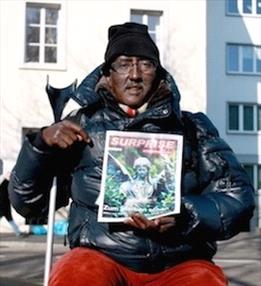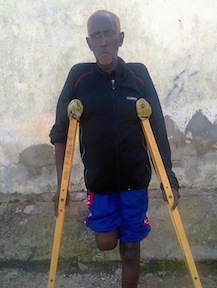
Photo courtesy of Surprise
Dr. Mohamed Ali Nur sells the magazine
Surprise on the streets of Basel, Switzerland, in an effort to support his family.
Surprise
published an article about Dr. Mohamed Ali Nur, a Somali veterinarian working as a street vendor in Switzerland. The account described how violence in his homeland forced the doctor to abandon his career and flee for his life. Today, Dr. Man, as he calls himself for short, lives with most of his family in relative safely in the northern Swiss city of Basel, but poverty endangers their well-being. Man and his wife sell Surprise
, one in a network of street publications around the world that provide people who are homeless and indigent a way to earn income.
The VIN News Service contacted Man to bring his story to his veterinary colleagues. The narrative that follows is composed of parts of the original article — which was recorded by Claudia Spinnler, translated by Jane Eggers and reprinted with permission from Surprise
— and information Man emailed to the VIN News Service elaborating on his background in veterinary medicine and his current circumstances. I often think of my previous job and the responsibility I had there. Today, I stand in the street and sell newspapers. That’s something completely different. But I enjoy selling the street paper. I’d rather look forward in life than look back.
I’ve been in Switzerland since 2012. The time before that was turbulent.
In my home country, Somalia, I did a degree in veterinary medicine, graduating in 1982 from Somali National University Faculty of Animal Medicine and Husbandry in Mogadishu. My first job was with the Somali government's Ministry of Livestock Health, Forestry and Range. I started out in the diagnostic laboratory, then worked as a manager, first as a district field director, then regional field coordinator, then director of the pharmaceutical unit.
In 2003, I was hired by Vétérinaires Sans Frontières Suisse. [
Editor’s note: Veterinarians Without Borders Switzerland works predominantly for and with people who depend on livestock for their livelihoods, according to its website. Its veterinary development organization operates in six African countries, employing about 120 local people.]
I supervised vaccination teams and disease surveillance. I trained community animal health workers in remote areas, teaching them about diseases, the importance of animal hygiene and how to give injections and other forms of medication.
We taught local residents who were given poultry how to feed and house them and keep them clean, healthy and productive.
We promoted the establishment of private drug stores and coordination between animal-health stakeholders: local people, drug store owners, pharmaceutical companies, veterinarians and animal traders.
It was a good job with lots of responsibility.
Then civil war broke out.
The terrorist group al-Shabaab [an al-Qaeda affiliate] spied on me every day. They thought I was a spy working for the USA. I feared for my life. Lots of my colleagues were shot and killed. Then one night, on Oct. 11, 2011, they stormed my house.

Photo courtesy of Dr. Mohamed Ali Nur
A brutal attack in 2011 left Dr. Mohamed Ali Nur maimed and unable to continue working as a veterinarian in Somalia.
Fortunately, my family wasn’t at home at the time. They attacked with grenades. I lost my right leg and my whole stomach was hanging out of my body. I pretended to be dead. They thought I’d died in the attack, and they fled.
In total, I had 17 iron splinters from a grenade in my back. I barely survived. I was in a hospital for seven months and in a coma for a long time. If I hadn’t pretended to be dead, I wouldn’t have survived.
In 2012, Vétérinaires Sans Frontières Suisse brought me to Switzerland. My wife followed me, and since last November, five of my children, all under age 18, have also been living in Basel. Unfortunately, my eldest son is still in Somalia. Because he’s already grown-up, the Swiss authorities didn’t let him into the country. For my wife and me, it’s very hard to know that he has no future in our homeland. I don’t think he’ll ever be able to come to Switzerland, although we really want him to.
My family and I share a small, three-room apartment. In the future, I’d like to get a bigger apartment so the seven of us would have more space. Rent in Switzerland is high — one room goes for 800 Swiss francs [about $821]. We have welfare assistance to supplement our income selling
Surprise, but it isn’t enough to cover our needs.
All my children go to school. That’s very important to me. My wife and I are taking a German course. Learning the language is very important for integration. I speak four languages: Somali, Arabic, Italian and English. But learning German at my age, 60, is not that easy.
I always sell the paper on Fridays and Saturdays. Some people come especially to buy
Surprise from me. That gives me a good feeling. It’s also my sales strategy. I’m trying to build as big a customer base as possible. Already, friends of friends buy the paper from me, and so it goes on.
The most important thing is to be friendly and not to wear a grumpy expression. I always say “Guten Tag” nicely. Lots of customers are really interested in me and my story. That makes me very happy. The Swiss women are all especially nice.
Surprise helps my wife and me to find friends. But the most important thing is, it helps us to learn German. It’s very important to us to be properly integrated because life in Switzerland is our future.
What worries me most is my health. Since the attack in Somalia, I wear a prosthetic leg that hurts a lot. I can walk only with great difficulty, as the prosthetic weighs 15 kilos [33 pounds]. I fall down every day once or twice.
I applied to my health insurance for a lighter, more modern prosthetic, but the application was turned down for cost reasons. The prosthetic costs 21’000 Swiss francs [about $21,500]; I cannot afford it. If I could, my income problem would be solved because I’d be able to work. I would like to practice veterinary medicine again, if possible in Switzerland, or do similar work.
As a street vendor, the cold causes me problems, too. We’re only allowed to sell the paper outside. After a time, I can’t feel my fingers anymore. In the summer, it’s much better.
I often think of the past, of the night of the grenade attack and its consequences. It’s sometimes very hard when those memories arise. And it happens very often.
One day, I’d like to return to Somalia, as long as it’s safe. It’s not easy to start again from nothing. But we managed it here in Switzerland, after we’d lost everything in Somalia. And that makes me thankful.
Editor’s note: This story has been changed from the original to add Dr. Man’s graduation year and correct a time reference in his work history.